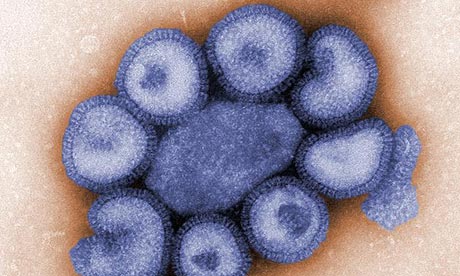
The current swine flu outbreak may now have peaked in Scotland, experts believe, suggesting that the surge in cases in England will subside within weeks.
One of the UK's leading bacteriologists, Professor Hugh Pennington, said this morning that Scotland was "possibly through the worst of this phase of the virus".
Despite a steep increase in cases in England, it is expected the latest Scottish estimated figures will show a decline when they are released later today after cases in the worst hotspots – Glasgow and Paisley – began to tail off earlier this month.
As a result, Scottish health ministers are not following moves in England to set up a national flu pandemic helpline because existing NHS services are able to cope with the current rate of cases.
The H1N1 virus caught hold in Scotland more quickly, after the first cases in the UK emerged in the small town of Polmont near Falkirk in April, and the first death of a swine flu patient outside the Americas.
To the surprise of experts, the virus was confined largely to three clusters - in southern Glasgow, Paisley and Dunoon, which erupted in May and June. The outbreak in Dunoon subsided quickly. Reported flu cases in the greater Glasgow area – which saw the first swine flu deaths in the UK – have also declined.
Last week, the Scottish health secretary, Nicola Sturgeon, said the overall rate of people reporting flu-like symptoms was not significantly higher than normal for this time of year. She said there were "encouraging signs" that cases were declining in the Glasgow area.
Prof Pennington, speaking on BBC Radio Scotland this morning, also cautioned against the rush to set up mass vaccinations of the population before the vaccine had been fully tested – a move being considered by ministers.
He said proposals to bypass normal testing procedures were laid out in the flu pandemic plan, but this virus was not proving as fatal or virulent as predicted in the plans. Pennington suggested it may be wiser to wait until the vaccine had been fully tested and if necessary altered before rushing it out.
The Guardian revealed today that Scotland's flu pandemic plans – drafted last year before the swine flu outbreak – had predicted that the next major outbreak could kill between 5,100 and 63,570 people in Scotland alone, in a matter of weeks.
But the highest mortality rate was based on the virus infecting 50% of the population and killing 2.5% of those infected. The mass vaccination plans are based partly on this official modelling. However, the H1N1 virus is far less virulent, although officials do fear the mortality rate could increase this winter, and get close to the 5,100 figure.
Pennington said: "Once the initial tests have been done I think there is a possibility - laid out in the pandemic plan - that we could use emergency procedures just to rush it through before all the test results have been analysed and completed.
"I'd be concerned about that because the pandemic plan was looking really at a virus that was much higher mortality than the one we're seeing now, the one we're seeing now is basically no different in that respect from seasonal flu."

